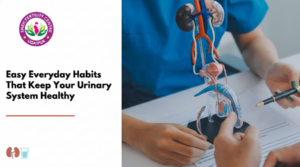Why Are Regular Prostate Check-ups Important?
Many prostate conditions develop silently, without noticeable symptoms in the early stages. Regular screenings help in:
✔ Early detection of prostate cancer – Increases treatment success rates.
✔ Managing benign prostatic hyperplasia (BPH) – Prevents complications like urinary retention.
✔ Detecting prostatitis (prostate inflammation) – Helps in timely treatment.
✔ Assessing overall urinary and reproductive health.
Common Prostate Conditions
1. Benign Prostatic Hyperplasia (BPH)
- What is it? A non-cancerous enlargement of the prostate gland, common in aging men.
- Symptoms: Frequent urination, weak urine stream, difficulty emptying the bladder.
- Management: Lifestyle changes, medications, or minimally invasive procedures.
2. Prostatitis (Prostate Inflammation/Infection)
- What is it? Inflammation of the prostate due to bacterial infection or other causes.
- Symptoms: Pain in the lower abdomen, painful urination, fever, or pelvic discomfort.
- Treatment: Antibiotics, anti-inflammatory medications, and hydration.
3. Prostate Cancer
- What is it? A malignant growth in the prostate, which is one of the most common cancers in men.
- Symptoms: Often asymptomatic in the early stages, later symptoms include difficulty urinating, blood in urine, and pelvic pain.
Detection & Treatment: Regular PSA tests, digital rectal exams (DRE), and biopsies help in early diagnosis and timely treatment.
Key Tests for Prostate Health
Regular screenings can prevent complications and ensure better prostate health. Some important tests include:
✔ Prostate-Specific Antigen (PSA) Test – Measures PSA levels in the blood to detect potential issues.
✔ Digital Rectal Exam (DRE) – A physical examination to check for abnormalities.
✔ Urine Tests & Imaging – Identify infections, obstructions, or tumors.
Who Should Get Regular Prostate Check-ups?
✔ Men over 50 should undergo annual prostate screenings.
✔ Men over 40 with a family history of prostate cancer.
✔ Men experiencing urinary problems like frequent urination, weak flow, or difficulty urinating.
Tips to Maintain a Healthy Prostate
✅ Stay Active: Regular exercise improves overall urological health.
✅ Eat a Balanced Diet: Include fruits, vegetables, and healthy fats while avoiding processed foods.
✅ Stay Hydrated: Drinking enough water helps maintain urinary function.
✅ Limit Alcohol & Caffeine: Reduces irritation to the bladder and prostate.
✅ Regular Check-ups: Early detection ensures better management.
Expert Prostate Care at Sneh Fertility & Urology Center
At Sneh Fertility & Urology Center, we provide comprehensive prostate health assessments, advanced diagnostics, and personalized treatments to ensure optimal health.






